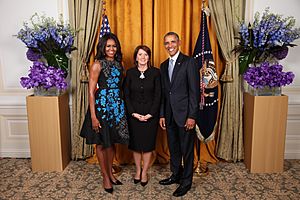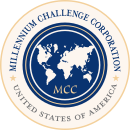Atifete Jahjaga facts for kids
Quick facts for kids
Atifete Jahjaga
ROF I
|
|
|---|---|
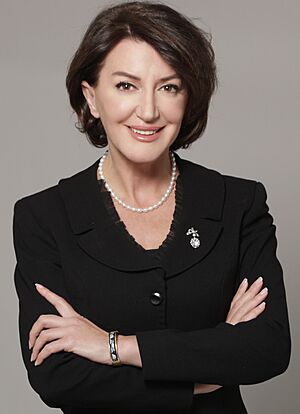
Portrait of President Jahjaga
|
|
| 3rd President of Kosovo | |
| In office 7 April 2011 – 7 April 2016 |
|
| Prime Minister | Hashim Thaçi Isa Mustafa |
| Preceded by | Behgjet Pacolli Jakup Krasniqi (Acting) |
| Succeeded by | Hashim Thaçi |
| Personal details | |
| Born | 20 April 1975 Gjakovë, SR Serbia, Yugoslavia (now Gjakova, Kosovo) |
| Political party | Independent |
| Spouse |
Astrit Kuçi
(div. 2018) |
| Alma mater | University of Pristina University of Leicester University of Virginia |
| Signature | |
| Website | Jahjaga Foundation |
Atifete Jahjaga (born 20 April 1975) is a politician from Kosovo. She was the third President of Kosovo. She made history as the first female President of Kosovo. She was also the youngest female head of state elected to that position. Before becoming president, Jahjaga was a high-ranking officer in the Kosovo Police. She was a General Lieutenant Colonel, which was the highest rank a woman had reached in police in Southeastern Europe.
Contents
Early Life and Education
Atifete Jahjaga was born in Gjakova, a city in what was then Yugoslavia. Her family roots are from northern Albania. She went to school in Gjakova. In 2000, she earned a law degree from the University of Pristina.
Later, she studied police management and criminal law in the United Kingdom. She also received special training in Germany and the United States. In 2007, she earned another degree in Crime Science from the University of Virginia.
Police Career
After the Kosovo War, Jahjaga joined the Kosovo Police. She started as an officer and worked her way up. She became a major, then a colonel, and finally a major general.
She served as the Deputy Director of the Kosovo Police. For a short time in 2010, she was even the acting General Director. During her police career, she was seen as a promising new leader.
President of Kosovo
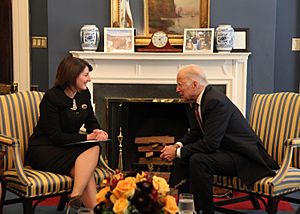
In 2011, Kosovo faced a political challenge. The country needed a new president. On April 6, 2011, Atifete Jahjaga was chosen as a possible candidate. Many political parties supported her. The U.S. Ambassador to Kosovo, Christopher Dell, also encouraged lawmakers to vote for her.
Even though she was well-known in the police, many people didn't know her political ideas. On April 7, 2011, Jahjaga was elected President. She was the only president in Kosovo's history to be elected in the very first round of voting.
In her first speech as President, Jahjaga shared her main goals. She wanted to guide Kosovo towards joining the European Union and the United Nations. She said that Kosovo's dream was to be part of the EU and have a strong friendship with the United States.
Presidency
Building Kosovo's Image
From 2011, President Jahjaga worked to make Kosovo's government stronger. She also worked to help other countries recognize Kosovo as an independent nation. She promoted Kosovo's goal of joining European groups. She also supported efforts for peace and working together with other countries. She encouraged businesses from other countries to invest in Kosovo.
She wanted the presidency to play a bigger role in Kosovo's growth. She traveled to many countries and attended international meetings. This helped to show Kosovo's progress to the world. Her leadership was praised by many international leaders.
Leading by the Constitution
President Jahjaga used her powers to make sure laws followed the country's constitution. She also made sure they met European Union standards. For example, in 2012, she sent a draft law back to parliament. She asked them to remove parts that could limit freedom of expression. These parts would have made it a crime to say certain things or forced journalists to reveal their sources. She believed these rules were not fair.
During elections in 2013 and 2014, she worked to make sure voting was fair and clear. This was important because there had been problems in earlier elections. International observers noted that these elections were much better.
After the 2014 elections, it was hard for political parties to form a new government. President Jahjaga met with party leaders to help them agree. U.S. President Barack Obama praised her efforts during this time.
She also helped set up a special court. This was part of Kosovo's promise to the European Union. She also created three special councils. These councils helped people from different groups, like businesses and universities, share their ideas with the government. She also met regularly with people from different ethnic groups.
European Integration
President Jahjaga strongly supported Kosovo joining the European Union. In 2012, she started the National Council for European Integration. This group helped different political parties work together on the European plan. They also launched a study to see how Kosovo could join the EU. In 2013, Kosovo created its first plan for joining Europe.
She also worked on making it easier for Kosovar citizens to travel to EU countries without a visa. She pushed for Kosovo to meet all the requirements by 2015.
When many Kosovar citizens moved to Western Europe in 2015, she visited affected towns. She talked to people to understand their concerns. European officials praised her for helping during this time.
Upholding the Rule of Law
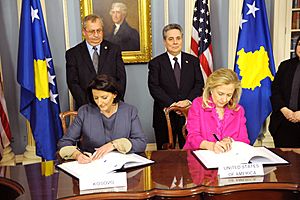
On February 14, 2012, President Jahjaga created the National Anti-Corruption Council. This group helps different government offices work together to fight corruption. She believed in a fair and independent justice system.
She also changed the rules for granting pardons. A pardon is when a person who was found guilty of a crime is forgiven. She made the rules much stricter. During her time, very few pardons were given. In 2015, no pardons were given at all.
Keeping the Country Safe
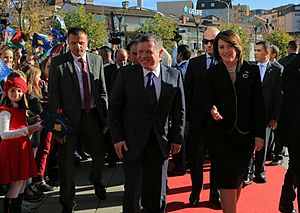
In 2014, Kosovo faced concerns about some of its citizens joining groups that cause trouble in other countries. President Jahjaga worked with national security groups to deal with this issue. They worked to stop people from joining these groups.
She also took part in a United Nations meeting in 2014. This meeting was about how countries could work together to fight against groups that cause trouble. In March 2015, she signed a law that made it illegal for Kosovar citizens to fight in foreign conflicts. This law helped make Kosovo safer.
The United States and the European Union praised Kosovo for its efforts to fight against groups that cause trouble.
Attracting Investments
President Jahjaga worked to bring more foreign businesses to Kosovo. She wanted to make Kosovo a good place for people to invest their money. She believed that working with businesses would help Kosovo's economy grow.
In 2015, she signed an agreement for a large donation from the United Arab Emirates. This money was used to build a new children's hospital in Kosovo.
Empowering Women
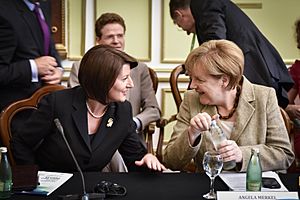
During her time as president, Atifete Jahjaga started projects to help women in Kosovo. In 2012, she hosted a big meeting called "Partnership for Change—Empowering Women." About 200 leaders from around the world attended. This meeting created the "Pristina Principles." These were ideas to support women's rights in politics, jobs, and justice.
In May 2012, Jahjaga joined the Council of Women World Leaders. This group includes women who are or were presidents and prime ministers. They work to help women become leaders around the world.
Promoting Peace and Understanding
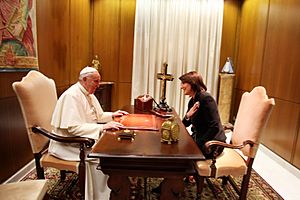
President Jahjaga worked to encourage communication and cooperation among different groups in Kosovo. She took part in talks between different religions. She also met with minority groups. In 2013, she visited a Serbian Orthodox Monastery during Easter. She encouraged people to continue to be tolerant of each other.
She also led a council that gave ideas to help non-majority communities. These ideas were about education, jobs, and being included in society.
Supporting People Affected by Conflict
President Jahjaga was involved in helping people who faced difficult times during the Kosovo conflict. In March 2014, she created a special council. This group included government, community, and international organizations. Their goal was to help people who were hurt during the war.
In June 2015, an artist named Alketa Xhafa-Mripa created an art project in Pristina. It was called "Thinking of You." This project helped raise awareness and show support for those who suffered. President Jahjaga supported this project. People donated dresses as symbols of support. The project gained international attention.
Millennium Challenge Corporation
President Jahjaga worked to help Kosovo qualify for special development money from the U.S. Government. This money comes from the Millennium Challenge Corporation (MCC).
In 2015, she created a group to help Kosovo improve its performance in areas like economic freedom and good government. On November 6, 2015, the MCC announced that Kosovo had passed its scorecard for the first time. This meant Kosovo was doing better in fighting corruption.
In December 2015, the MCC decided that Kosovo could receive a large investment program.
Office of the President
During President Jahjaga's time, the Office of the President was seen as the most trusted government office by the people of Kosovo. She was the first president who was not tied to one political party. She made sure the office was open to everyone. The President's office helped different government groups work together. This made the government more open and effective.
Jahjaga lived a simple life while in office. Her team was recognized for being very open and responsible. Her advisors were experienced professionals. Many of them studied at top universities.
The Jahjaga Foundation
The Jahjaga Foundation is a non-profit group started by Atifete Jahjaga in March 2018. Its main goal is to help Kosovo and the Balkans grow democratically. It focuses on including all people in society. It also supports groups that have been left out. This helps build peace in the region.
Countries Visited
| Country | Year | Cities visited | Type of visit | |
|---|---|---|---|---|
| 1 | 2011, 2012 | Tirana, Durrës, Pogradec | Working visit | |
| 2 | 2012, 2013, 2014 | Vienna, Alpbach | State visit
Working visit |
|
| 3 | 2011, 2012, 2013 | Brussels | Working visit | |
| 4 | 2015 | Sofia | Working visit | |
| 5 | 2011, 2012, 2015 | Zagreb, Dubrovnik | Official visit
Working visit |
|
| 6 | 2011 | Prague | Working visit | |
| 7 | 2015 | Paris | Working visit | |
| 8 | 2011, 2014 | Berlin, Munich | Working visit | |
| 9 | 2015 | Vatican | Working visit | |
| 10 | 2014 | Tegucigalpa | State visit | |
| 11 | 2011 | Budapest | State visit | |
| 12 | 2011, 2015 | Rome, Venice | Official visit | |
| 13 | 2014, 2015 | Amman, Petra, Dead Sea | Official visit, Working visit | |
| 14 | 2011 | Vilnius | Working visit | |
| 15 | 2011 | Ohrid | Working visit | |
| 16 | 2013 | Kuala Lumpur | Working visit | |
| 17 | 2012, 2015 | Budva | Working visit | |
| 18 | 2013 | The Hague, Amsterdam | Working visit | |
| 19 | 2014 | Panama City | State visit | |
| 20 | 2011 | Warsaw | Working visit | |
| 21 | 2014 | Bucharest | Working visit | |
| 22 | 2014 | Dakar | Working visit | |
| 23 | 2013 | Bratislava | Working visit | |
| 24 | 2011, 2015 | Ljubljana, Portorož | Official visit
Working visit |
|
| 25 | 2015 | Bern, Zürich | Official visit | |
| 26 | 2012, 2013, 2014 | Istanbul | Working visit | |
| 27 | 2012, 2014, 2015 | Abu Dhabi, Dubai | Official visit
Working visit |
|
| 28 | 2013, 2014, 2015 | London, Durham, Leicester | Working visit | |
| 29 | 2012, 2013, 2014 | Washington, D.C., New York, Des Moines | Working visit |
Honours and Awards
Honours
 Italy
Italy
 Panama
Panama
- Honorary citizen of Panama City.
Awards
- 27 June 2013 - An honorary degree from the University of Durham.
- 21 September 2014 - Leadership in Public Service Award from the Clinton Global Initiative.
- 16 July 2015 - An honorary Doctor of Laws degree from the University of Leicester.
See also
 In Spanish: Atifete Jahjaga para niños
In Spanish: Atifete Jahjaga para niños
- Ismet Asllani
 | Charles R. Drew |
 | Benjamin Banneker |
 | Jane C. Wright |
 | Roger Arliner Young |


